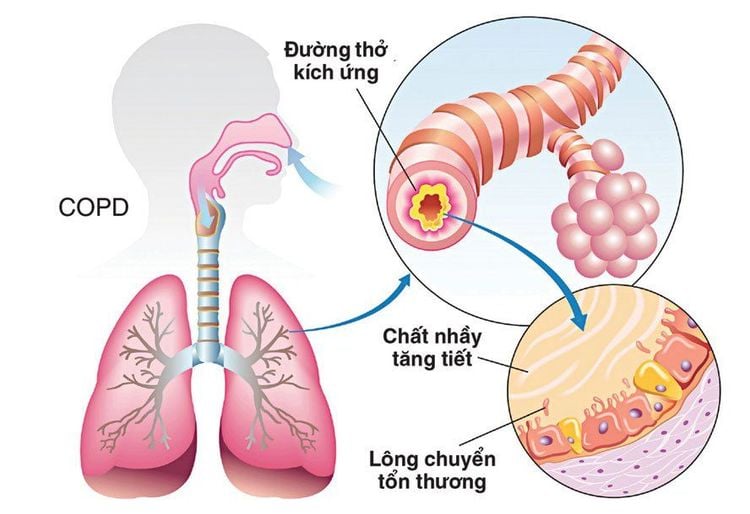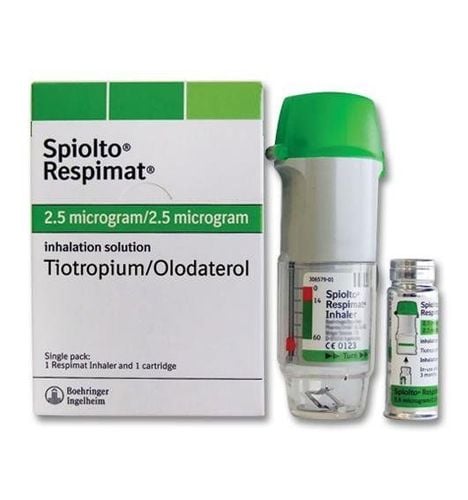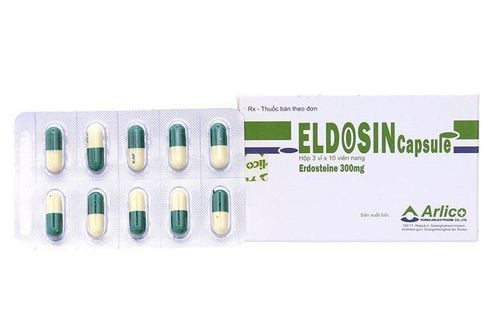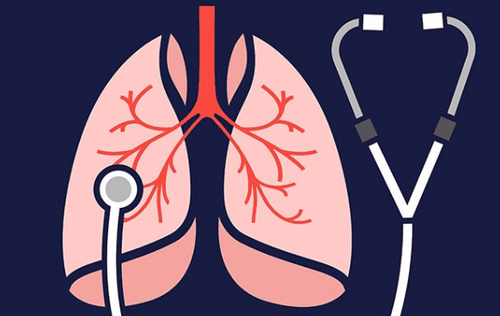This is an automatically translated article.
Is chronic obstructive pulmonary disease contagious is a question of many people with lung disease, psychologically affecting family members and those around them. The following article helps patients as well as those around them better understand this chronic disease.
1. What is chronic obstructive pulmonary disease?
Chronic obstructive pulmonary disease (COPD) is a chronic lung disease that causes blocked airflow from the lungs. Characterized by shortness of breath, cough, and expectoration. It is caused by long-term exposure to irritating gases or particulate matter, usually from cigarette smoke. The disease progresses from an acute to a chronic form and tends to get worse over time. Chronic obstructive pulmonary disease may present with exacerbations during the year presenting with increased cough, sputum production, and shortness of breath unresponsive to daily medications requiring medication change or hospitalization People with COPD are at risk heart , lung cancer and a host of other conditions that can cause respiratory failure and death People with COPD who require lifelong daily preventive medication can control symptoms and ensure an exceptional quality of life may reduce the risk of other related diseases.

Bệnh phổi tắc nghẽn mạn tính
2. Cause
The main cause of COPD is smoking. In addition, COPD often occurs in people who are exposed to smoke from burning fuel for cooking and heating, air pollution, smog,...
Mechanism of disease: Air goes down the trachea into the lungs through the bronchi then these tubes divide into many bronchioles ending in clusters of small air sacs (alveoli). The air sacs have very thin walls filled with small blood vessels (capillaries). The oxygen in the incoming air enters these blood vessels and enters the bloodstream. At the same time, carbon dioxide - a gas that is a waste product is exhaled. Chronic obstructive pulmonary disease causes a loss of elasticity that causes some air to become trapped in the lungs when exhaling. Causes of airway obstruction include:
Emphysema causes destruction of the delicate walls and elastic fibers of the alveoli, narrowing the airways leading to impaired airflow, chronic bronchitis causes the bronchial tubes to become inflamed and narrow and the lungs to block the passage of the airways. Cigarette smoke and other irritants. The lung damage that leads to COPD is caused by long-term smoking. Other irritants that are also risk factors for COPD include cigar smoke, secondhand smoke, secondhand smoke, air pollution, and workplace exposure to dust, fumes, or fumes. Alpha-1-antitrypsin deficiency. Alpha-1-antitrypsin deficiency is an inherited disorder that can affect the liver as well as the lungs.
3. Risk factors
Exposure to secondhand smoke. The more years the patient smoked and the more packs smoked, the greater the risk. Pipe, cigar and marijuana smokers may also be at risk, as can those exposed to large amounts of secondhand smoke. Asthma and smokers increase the risk of COPD further Occupational exposure Exposure to smoke from burning fuel for cooking and heating in poorly ventilated homes has a higher risk of developing COPD. Age over 40. COPD develops slowly over the years so over age 40 when symptoms start Genetic deficiency of alpha-1-antitrypsin causes some cases of COPD
4. Is chronic obstructive pulmonary disease contagious?
From the above causes, it can be seen that chronic obstructive pulmonary disease is not contagious because the main cause of the disease is air pollution, especially cigarette smoke. Chronic obstructive pulmonary disease is not caused by bacteria or viruses like other respiratory diseases. Bacteria, viruses, and parasites can only trigger an exacerbation of COPD, so the patient's family members take good care of the patient without worrying.
5. Complications

Bệnh phổi tắc nghẽn mạn tính có thể gây ra bệnh tăng huyết áp
COPD can cause many complications such as:
Respiratory tract infections caused by bacteria, viruses, parasites, fungi,... People with COPD are more likely to develop respiratory infections that lead to difficulty breathing. In addition, cough and expectoration increase causing further damage to lung tissue. An annual flu shot and regular vaccinations against pneumococcal pneumonia can prevent some infections. COPD can increase the risk of cardiovascular diseases. People with COPD have a higher risk of developing lung cancer. Quitting smoking can reduce the risk of COPD that can cause hypertension Vinmec International General Hospital is one of the hospitals that not only ensures professional quality with a team of leading medical doctors, system of modern equipment and technology, but also outstanding with comprehensive and professional medical examination, consultation and treatment services; civilized, polite, safe and sterile medical examination and treatment space.
Please dial HOTLINE for more information or register for an appointment HERE. Download MyVinmec app to make appointments faster and to manage your bookings easily.













